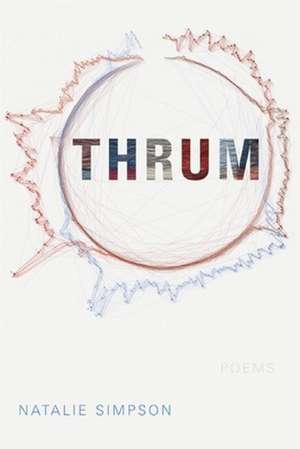Thrum
Autor Natalie Simpsonen Limba Engleză Paperback – 9 iun 2014
“To get at turn away.” In Thrum, her second collection of poetry, Natalie Simpson reveals how making sense is not always the same as making meaning. Her supple and agile poems seduce the weary reader away from representation and toward sound, texture, and absence. Here, a sentence is no longer a sentence, but “a word in pieces, plastered, faster,” which “crumbles” on the page into strange and luminous syntactical patterns that create new and better pathways for meaning.
Roughly woven, rough to touch. Small words stealing fog.
The rest are tongue flicks.     Home is how hard you eat your heart out.
Simpson writes in a tradition that begins with Gertrude Stein and includes many contemporary Canadian and American poets, such as Lisa Robertson, Harryette Mullen, Anne Carson, Dorothy Trujillo Lusk, Dennis Lee, Nicole Brossard, and Juliana Spahr. Like the authors and the work that has influenced it, Simpson’s free writing engages with language non-representationally and pays close attention to sound, rhythm, and energy within the sentence, often in dialogue with phrases from other poets. Not limited to the literary, Simpson also recontextualizes snippets of language from other discourses, such as news, advertising, and law.
Thrum records a poetics of process. Immersing herself in loosely strung lines and repeated phrases, Simpson’s speaker seeks refuge in disordered language, in the alternative logic of poetic devices. For Simpson, the act of writing and unwriting is a movement toward beauty and hope, an opening. Sound and rhythm. Syntax and punctuation. Tension in the sentence. Torque. Making strange, Simpson reveals, is making sense, and placing pressure on language through poetic devices uncovers its beautiful absurdities, its languid uncertainties.
Roughly woven, rough to touch. Small words stealing fog.
The rest are tongue flicks.     Home is how hard you eat your heart out.
Simpson writes in a tradition that begins with Gertrude Stein and includes many contemporary Canadian and American poets, such as Lisa Robertson, Harryette Mullen, Anne Carson, Dorothy Trujillo Lusk, Dennis Lee, Nicole Brossard, and Juliana Spahr. Like the authors and the work that has influenced it, Simpson’s free writing engages with language non-representationally and pays close attention to sound, rhythm, and energy within the sentence, often in dialogue with phrases from other poets. Not limited to the literary, Simpson also recontextualizes snippets of language from other discourses, such as news, advertising, and law.
Thrum records a poetics of process. Immersing herself in loosely strung lines and repeated phrases, Simpson’s speaker seeks refuge in disordered language, in the alternative logic of poetic devices. For Simpson, the act of writing and unwriting is a movement toward beauty and hope, an opening. Sound and rhythm. Syntax and punctuation. Tension in the sentence. Torque. Making strange, Simpson reveals, is making sense, and placing pressure on language through poetic devices uncovers its beautiful absurdities, its languid uncertainties.
Preț: 66.33 lei
Preț vechi: 86.78 lei
-24% Nou
Puncte Express: 99
Preț estimativ în valută:
12.69€ • 13.29$ • 10.50£
12.69€ • 13.29$ • 10.50£
Carte indisponibilă temporar
Doresc să fiu notificat când acest titlu va fi disponibil:
Se trimite...
Preluare comenzi: 021 569.72.76
Specificații
ISBN-13: 9780889228504
ISBN-10: 0889228507
Pagini: 113
Dimensiuni: 150 x 213 x 10 mm
Greutate: 0.14 kg
Editura: Talon Books
Locul publicării:Canada
ISBN-10: 0889228507
Pagini: 113
Dimensiuni: 150 x 213 x 10 mm
Greutate: 0.14 kg
Editura: Talon Books
Locul publicării:Canada
Notă biografică
Natalie Simpson is a former filling Station editor who recently moved back to Calgary, Alberta, from Vancouver, BC. Her poetry has appeared in Queen Street Quarterly, dANDelion, and West Coast Line, in chapbooks from housepress and MODL press, and in the anthologies Post-Prairie (Talonbooks) and Shift & Switch (Mercury Press).
Cuprins
Descriere
Natalie Simpson expertly subverts syntax and crafts illuminating new language structures in these smart and often funny poems.
